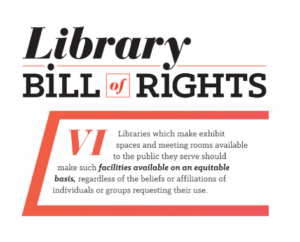
By Meggie Lesher, DCI Fellow
As a research librarian at Davidson, I regularly run into controversy, whether it is cutting edge yet contested scientific findings or problematic interpretations of historical events. I am often reminded that “a truly great library has something in it to offend everyone,” a quote from fellow librarian Jo Goodwin that circulates widely during Banned Books Week or when censorship issues fire up on social media.[1] Libraries have a long tradition of navigating a delicate balance between being public spaces for all and the need to regulate these spaces.
For example, most public libraries allow community groups to use meeting rooms and similar spaces within the library building. Not long ago, the American Library Association (ALA) revisited the Library Bill of Rights as it pertained to meeting room policies. A white supremacist group booked a public library meeting room, which sparked controversy over who can use library spaces. The ALA’s Intellectual Freedom Committee proposed the following language about library meeting rooms:
“Public libraries are bound by the First Amendment and the associated law governing access to a designated public forum. A publicly funded library is not obligated to provide meeting room space to the public, but if it chooses to do so, it cannot discriminate or deny access based upon the viewpoint of speakers or the content of their speech. This encompasses religious, political, and hate speech.
“If a library allows charities, non-profits, and sports organizations to discuss their activities in library meeting rooms, then the library cannot exclude religious, social, civic, partisan political, or hate groups from discussing their activities in the same facilities.”[2]

This language was adopted by the ALA in June 2018, and this decision did not go over well; library staff took to Twitter to share #NoHateALA and demonstrated their disagreement with the inclusion of hate groups in the guidance. The ALA subsequently voted to rescind this interpretation and return to the original language of the Library Bill of Rights released in 1991, included below:
“VI. Libraries which make exhibit spaces and meeting rooms available to the public they serve should make such facilities available on an equitable basis, regardless of the beliefs or affiliations of individuals or groups requesting their use.”[3]
Concerned parties, both from the public and library staff, wanted the ALA to go further and affirm that hate speech and hate groups did not belong in the library. Returning to an older version of the Library Bill of Rights seemed like a step in the wrong direction to many critics of the decision. Yet, libraries have the responsibility to maintain access to information and public spaces no matter the affiliation or activities of the groups desiring to use the space. Libraries must call on agreements, such as the Library Bill of Rights, to ensure fairness. While affirming its commitment to intellectual freedom, the ALA has also encouraged libraries to “adopt and enforce user behavior policies that protect library users and staff from harassment.”[4]
The balance between fairness and regulation reminds me of the figurative space we enter together when preparing to deliberate. Just like libraries, there is a real need to regulate such spaces. For those new to DCI, we begin each deliberation with our conversation agreements. These agreements cover the ground rules for how we treat each other as well as guidelines about how to approach the discussion. Essentially, they hold us together while keeping us accountable. Regulation may seem like too strong of a word for our conversation agreements, yet we completed plenty of training about how to create an environment conducive to reaching a deliberative state— another type of delicate balance! We foster a shared understanding when we follow our conversation agreements and participate in difficult conversations together. Without at least some regulation, the deliberative space seems untenable and difficult to maintain. Let’s consider those agreements below.
Conversation AgreementsEach of these agreements suggests both norms to follow in the conversation as well as behaviors to avoid. For example, “be an attentive and active listener” suggests showing clearly – e.g., through your body language and your responsiveness to what others say — that you are listening to other members of the group. This agreement also suggests that being an inattentive and passive listener – playing with your phone, getting distracted, interrupting, not acknowledging others’ views – is not appropriate behavior in a deliberative context. Most of the time these agreements are internalized and followed without any problem, but sometimes the group or the facilitator may need to intervene to remind everyone of them (and in rare occasions enforce them).
Another way to consider the need for coordination and agreement in deliberative spaces is to reflect on what debate looks like in our daily lives. “Debate” is often acrimonious, combative, and rarely conclusive or inspiring. It’s more for entertainment on TV rather than an opportunity to learn from each other as we grapple with difficult questions. This style of TV debate lacks the regulation that we employ in deliberation. I see the parallels with the ALA issues on meeting spaces; without regulation, we are not nearly as democratic as we can be. Even though everyone may not agree with the ALA’s current guidance related to library spaces, the decision reflects the necessary structures that encourage democracy, just as the structures within deliberation allow us to fully participate together. As we honor structures like the conversation agreements, we are better able to enter deliberative spaces with as much equity, access, and shared respect as possible.
Image Link: https://www.oif.ala.org/oif/wp-content/uploads/2018/07/OIF-post-meeting-rooms-e1531248052538-730×589.png
[1] Learn more about censorship on this podcast episode from Brooklyn Public Library’s Borrowed Podcast.
https://www.bklynlibrary.org/podcasts/something-offend-everyone
[2] Yorio, Lisa Peet & Kara. “ALA Rolls Back Inclusion of Hate Groups in Bill of Rights Revision.” Library Journal. Accessed November 06, 2021. https://www.libraryjournal.com?detailStory=free-speech-debate-erupts-with-alas-inclusion-of-hate-groups-in-revision-of-bill-of-rights-interpretation.
Image: LaRue, Jamie. “Library Meeting Rooms for All.” Intellectual Freedom Blog (blog), July 10, 2018. https://www.oif.ala.org/oif/?p=14997.
[3] American Library Association. “Library Bill of Rights.” https://www.ala.org/advocacy/intfreedom/librarybill
[4] American Library Association. “Meeting Rooms: An Interpretation of the Library Bill of Rights.” https://www.ala.org/advocacy/intfreedom/librarybill/interpretations/meetingrooms

Leave a Reply